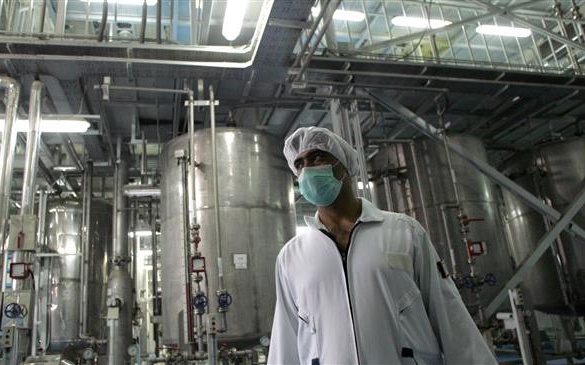Iran takes its first significant step to suspend the 2015 nuclear deal, as Donald Trump adds to confusion over his Administration’s policy in a confrontation with Tehran.
On Monday, Iran announced that it is quadrupling the production of 3.67% enriched uranium, with the quantity breaking the limits of the nuclear agreement within weeks.
Atomic Energy Organization spokesman Behrouz Kamalvandi said Iran is adhering to other terms for now. It is not resuming production of 20% uranium — which can be further enriched to military-grade 90%+ — or introducing advanced nuclear centrifuges.
But he said the increase in the lower-grade uranium was a message to the remaining powers (UK, France, Germany, Russia, and China) in the deal, after Trump’s withdrawal of the US last May and the imposition of comprehensive American sanctions in November.
He implicitly warned that Iran will take other steps if it is not satisfied by the response: “Our technical requirements and decisions by senior officials will determine our next measures.”
Kamalvandi said Iran has informed the International Atomic Energy Organization if its move.
Under the nuclear deal, Iran is restricted to 300 kg (660 pounds) 3.67% enriched uranium until 2030. The Islamic Republic ceased production of 20% uranium and shipped all stock outside the country.
Iranian officials, including President Rouhani, had warned that they would begin suspension of some terms of the deal unless other powers helped Iran out of its difficult economic situation amid US sanctions.
In early February the European Union announced the launch of a limited Special Purpose Vehicle to bypass the sanctions with non-dollar trade in Iranian oil and other commodities and goods.
But Tehran rejected the arrangement because of “humiliating conditions” such as the EU’s criticism of Iran’s missile program, its activities in the Middle East, and alleged bomb and assassination plots in Europe.
Trump’s Muddle Over Talks and “Threat”
Amid his Administration’s in-fighting over how far to press Iran with military moves, Trump gave a garbled statement to reporters on Sunday.
He both downplayed the Iranian “threat” pushed by Administration hawks such as National Security Advisor John Bolton, as they seek regime change, and talked tough about US capabilities.
“So with Iran we’ll see what happens. But they’ve been very hostile. They’ve truly been the number one provocateur of terror in this country and you know representing their country.
But certainly our country has been very much involved, because we’re trying to help a lot of people out. And I don’t mind that at all.
We have no indication that anything’s happened to our will happen but if it does it will be met obviously with great force. We’ll have no choice.”
Iranian State media seized on the statement as a rejection of the Administration’s warnings: “‘No Indication of Iran Threat’, Trump Admits”.
Earlier this month Bolton announced the move of a carrier task force, with the USS Abraham Lincoln and bombers, to the Persian Gulf. Bombers were also stationed at the US base in Qatar.
The National Security Advisor said the step was necessary because of Iranian threats to US troops in the region.
Last weekend, Bolton’s Administration opponents pushed back. They said Trump had said at a a Wednesday that there must not be military steps towards a war and had privately ridiculed the National Security Advisor over his hawkish position.
But a new possibility opened for the hardliners on Saturday as a Katyusha rocket landed near the US Embassy in Baghdad, Iraq. The Islamic Republic’s critics said an Iran-supported militia was likely to be responsible.
The leader of the Kataib Hezbollah militia, linked to Tehran, distanced the group from the incident and criticized the attack.
Trump has further added to uncertainty when, with his penchant for high-profile summits, he has offered talks with Iranian leaders.
Criticized by US hardliners and ridiculed by Iranians for his statement, “We have given them phone numbers to contact us,” Trump stepped back on Sunday:
“We’ve not talked about it. We’ll see what happens if they call, we would certainly negotiate but that’s going to be up to them. I’d only want them to call if they’re ready. If they’re not ready they don’t have to bother.”

